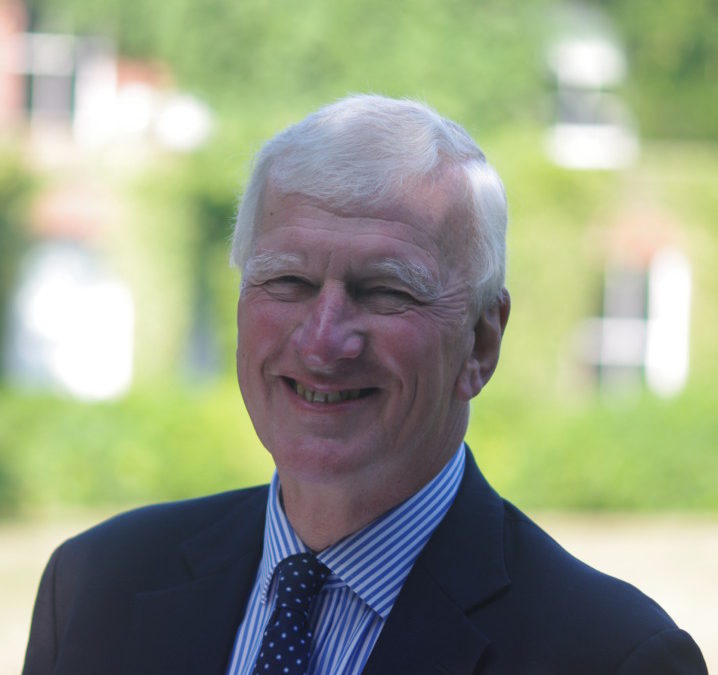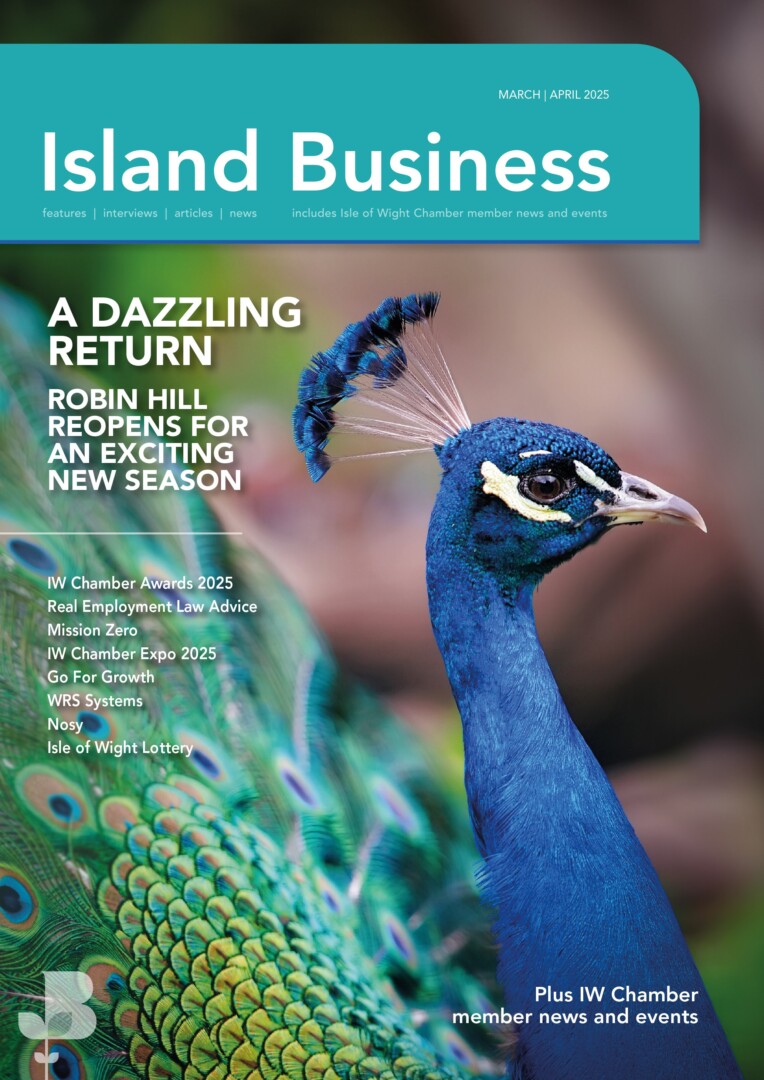Robert Hillier OBE is the new chairman of HIBA, a partnership between the Isle of Wight Chamber of Commerce, Hampshire Chamber of Commerce, the Hampshire and Isle of Wight offices of the British Marine Federation, the manufacturers’ organisation EEF, the Federation of Small Businesses, the Institute of Directors and the Southern Enterprise Alliance. Robert is also the chairman of Hillier Nurseries, a family business based in Ampfield near Romsey, one of Britain’s leading horticultural suppliers. He talks business with Tom Stroud.
What do you want to achieve as chairman of HIBA, and where do you see the Island fitting in?
I’m very fond of the Isle of Wight and I’ve had a cottage in Newbridge for 16 years now. When I was previously involved, with BusinessLink and before that the Hampshire Training and Enterprise Council, the Isle of Wight was looked after separately. That’s why I’m pleased that HIBA has got the Isle of Wight in its title and the Isle of Wight Chamber Of Commerce is represented and will be a part of the team. The Island is definitely a challenge. In the past it has been identified as a separate economy to the mainland and I don’t think that is necessarily the best thing for the Island or indeed for the mainland. I definitely see that there will be opportunities, particularly where discussions are going on in Hampshire which will involve things like the maritime sector, which is obviously a key part of the Isle of Wight’s economy. The Isle of Wight won’t just be talked about but will also be represented.
So for those that don’t know, what does HIBA do?
We’re looking to ensure that businesses have the support to achieve their goals. Our membership includes the British Marine Federation, EEF, the manufacturers’ organisation and the Solent Enterprise Alliance, all organisations that are designed to support business. We communicate with and hopefully will influence the LEPs, recognising the need for skilled people to do the work that businesses across the region will require. I was approached to help out HIBA when the previous chairman retired and I was flattered to be asked. My background is business support and I saw a need and an opportunity to get the parties involved in economic support to work closely together. I know a lot of the people who are involved in the sector and felt that I might be able to help to oil the wheels. In my first few months I’ve spent time with Enterprise M3 and I met with Gary Jeffries and Anne-Marie Mountifield from the Solent LEP at the Chamber’s luncheon in Cowes which was very productive. My role is about finding out how we can help them, and how they can help us too.
So the view is that the Island might be separated from the mainland but it isn’t isolated?
Exactly. It’s 20 minutes or so on the Red Jet and 10 minutes on the hovercraft, which is much quicker than going from Romsey to Winchester. That journey is only 8 miles but we have the M27 and the M3, which you can sit on for hours! Communications and travel aren’t bad at all for the Island. It’s a mindset really. The Island likes to be independent and I admire that in many ways, but if it’s going to take advantage of opportunities it needs to be prepared to work closely with the mainland. There’s often the comment that a fixed link would be good for industry and enterprise, although the independence of the caulkheads is definitely a part of the charm. I do think the Island is very supportive of itself and can be inward looking at times, and that’s understandable. Sometimes people will have to sit through meetings where non-Island issues are being discussed but you have to remain in touch and be a part of the team. I think if the Island only looked at trading with itself that could be dangerous. The Island has a wonderful opportunity now and the Solent has in the past been a limitation at times. We need to build on the people here and develop the skills and identify the opportunities for getting employment land to create more employment for the Isle of Wight.
We often talk about where the Island fits within the region. What about the view from the other side – how do you think businesses on the mainland see us?
I think it’s seen as an independent island. I don’t think people on the mainland generally spend a great deal of time thinking about it, which is a shame isn’t it? Perhaps it’s a case of “that’s the Island and I go there for my holidays”, but they don’t see what an important opportunity it offers on the south coast. I know that the Solent LEP is very aware of their responsibility to be very inclusive of the Island. HIBA should be able to work with the LEP to promote the Island and ensure that the Island is more involved in what is happening on the mainland. The Isle of Wight name is known worldwide, with Cowes Week and the America’s Cup. People want to come here, but it’s often just in the summer and people do need jobs all year round. I come here a lot and Cowes in the middle of winter is very different to Cowes Week and it’s a disappointing experience. I do think it is possible to use that worldwide reputation to create more employment here and that’s something I hope to do in my stay as chairman of HIBA.
The Isle of Wight is a contradiction sometimes isn’t it? We have some world-class businesses here but we also have challenges with employment and education that other parts of the south don’t. It’s awkward having to describe us as a “special case” but it is true, at least some of the time isn’t it?
I think that’s fair comment. These regional organisations often think in terms of the need, but also the number of people. The Isle of Wight has a population of around 140,000 and Hampshire is around 1.3 million people. The Island’s individual need is probably greater per head and people often feel that they’re getting a share – not necessarily what they need, when it comes to funding. The Solent LEP has definitely helped businesses on the Island in many ways and is offering direct support to businesses and also addressing the skills gap. Encouraging youngsters to stay on the Island, learn skills and support businesses has been tricky in the past but that is changing. It’s a shame if young people still feel that they have to leave the Island to get the standard of living that they seek. That’s something that I want HIBA to be able to address and for organisations to work more closely together.
Let’s talk about regionalism. Does that still matter? We talk about integrating the Island with Hampshire but does that matter in an increasingly global economy? What do you make of the idea of regional devolution?
I think the future definitely is regional and people need to realise that. The HIBA area goes right into Surrey and is a very substantial and successful region. It’s high tech, with reasonably good infrastructure and links. I know that the LEP are looking to improve connectability to help businesses to work together better. The challenge is to strengthen the region really. What little money is coming out of Europe is still distributed on a regional basis. In the past some of the problems have been that we have worked on a “local” basis, as unitary authorities or counties, and therefore didn’t meet the criteria to attract funding. The LEPs are designed to attract more money to their regions. Local authorities are inevitably going to change their structures in the future and across the region councils are under great pressure. Things will probably change dramatically over the next few years. I think HIBA will play an increasingly important role in years to come and I’m pleased that the Isle of Wight is at the heart of the organisation. Working together has to be the best way. HIBA is exciting and changes the role we play and how we play it.
First published in the October 2015 issue of Island Business magazine.



